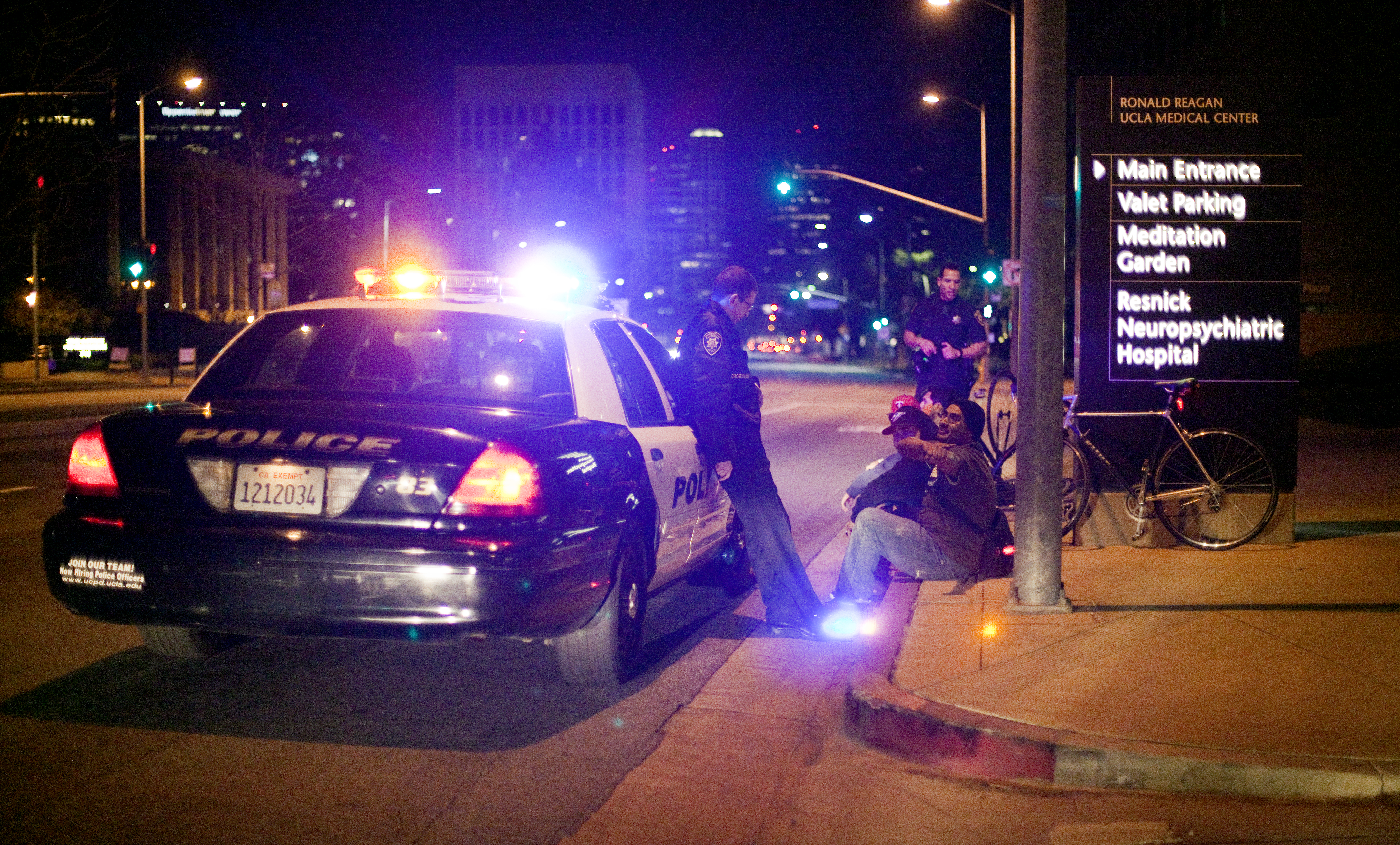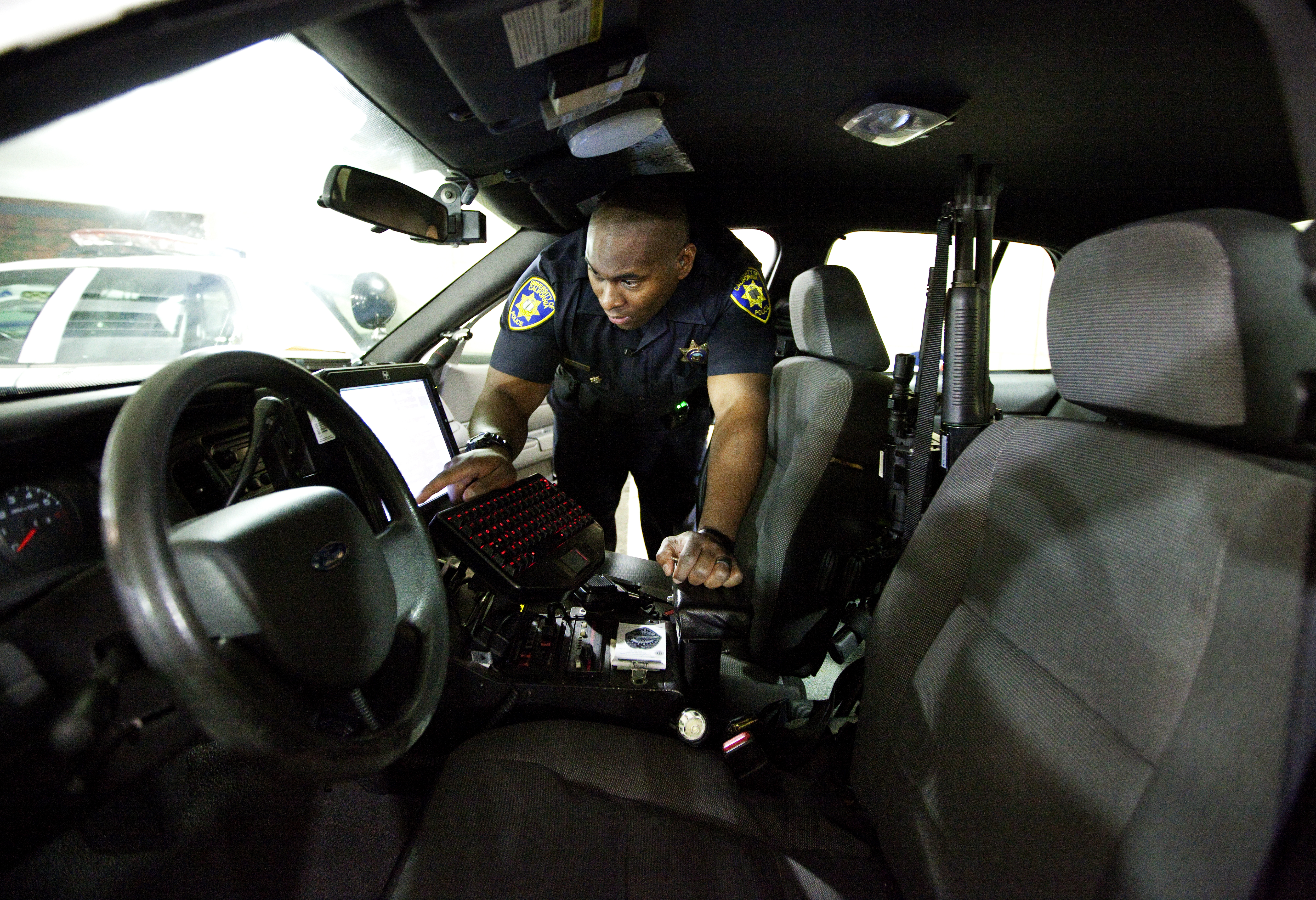
Officers question a group of bicyclists on Gayley Avenue outside the Ronald Reagan Medical Center. McBride said they were likely pulled over for a vehicle code violation, such as not having bicycle lights.

Before taking Daily Bruin reporters on a ride with him, Officer London McBride demonstrates the ins and outs of his patrol car, pointing out the audio and video recording capabilities that can be turned on remotely should a potentially threatening situation arise.
All I heard was “transient, third floor Engineering I.”
I was inside the university police department’s “brain room,” or the dispatch center, a mass of fancy computers, monitors and servers.
One dispatcher, invisible to me among the tangle of technology, asked Officer London McBride to check it out.
I couldn’t help but smile a little in anticipation. Before I knew it, I was in the front seat of a police car.
10 p.m.
We rolled out of the station to investigate the call of a homeless person wandering the halls of Engineering I, an old building in South Campus that looks like the setting of a scary movie.
We walked through the halls, checking the doors to make sure they were locked.
No sign of the homeless man.
Although UCPD gets many calls about homeless people in campus buildings, McBride has seen stranger.
A month ago, he and his partner found a student living in Boelter Hall.
The recent graduate was planning on moving in with friends in a week. Meanwhile, he had taken up residence in a small room for the past two weeks.
“We felt bad saying, “˜You know what, get your stuff and go,'” McBride said. “What are you supposed to do?”
They let him stay.
McBride said there is the letter of the law and the spirit of the law.
The letter dictates the law, but the spirit of the law informs officers to exercise compassion.
McBride said he sees himself as an educator.
“You gotta put people on the right path,” he said.
McBride grew up in Carson, Calif., where the sheriffs tried to put a face to the badge and gain the trust of the people they served.
At UCLA, McBride attempts to do the same by talking to students and building relationships.
Sometimes students are mistrusting of his effort to greet them, thinking they have done something wrong, he said.
11:21 p.m.
We headed next to the North Village. We cruised up and down the streets for a while, finally driving by a small parking lot on Strathmore Drive.
Another officer was looking in the window of a blue Honda.
Two men in the car were smoking marijuana.
The officers asked the men to sit down on the ground at the bumper of the car.
As the other officer ran their information, the driver, wearing a UCLA shirt, began to argue with McBride about the merits of medical marijuana.
“A little pain never hurt anyone,” McBride said to him.
The driver stamped out the small remainder of his marijuana and we left the scene.
Driving away, McBride asked me if I would have stopped the two men.
I didn’t really have an answer, but he said a lot of police work is based on a reasonable person’s judgment.
In other words, if I can see that something is wrong, he said, that’s how police know to stop someone.
1:30 a.m.
It got late quickly.
A student wearing a Superman shirt descended from Saxon Trail onto Gayley Avenue, asking McBride and another officer for permission to jaywalk. McBride responded that it wouldn’t be jaywalking.
1:47 a.m.
We drove by a group of four students walking in the street.
“Please walk on the sidewalk,” McBride said.
They were reactionless except for one woman who turned to look at us driving by.
“If I were flying over the hill, if I were a drunk driver … that’d be the last thing she sees,” McBride told me.
Despite some of the difficulties in police work, McBride says he loves his job.
A senior officer once advised him that his visibility in the community is what makes the difference.
“You never know who you saved just by being out there. You never know what criminal you deterred just by your mere presence.”
2 a.m.
I decided to call it quits.
The night had been fairly quiet for most of the officers on patrol, aside from a brief pursuit on Hilgard Avenue.
McBride dropped me off outside my apartment and said I’m welcome to ride with him again any time.
That will definitely happen.
If you’ve been stopped by the police, but they just wanted to say hi, e-mail Greene at sgreene@media.ucla.edu.
